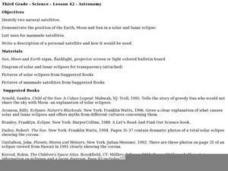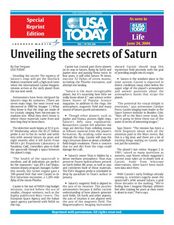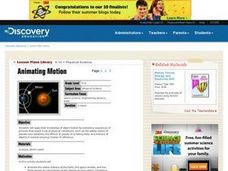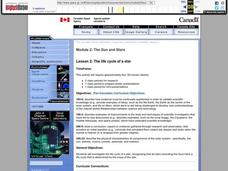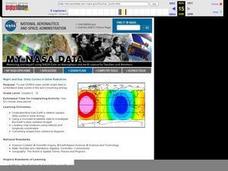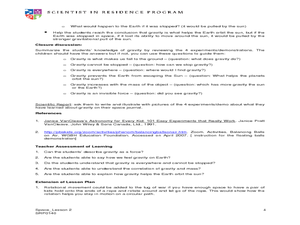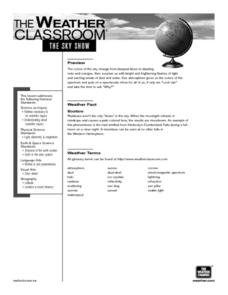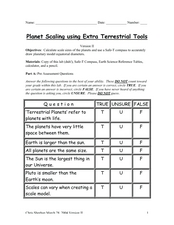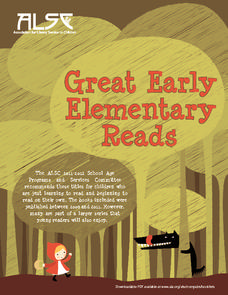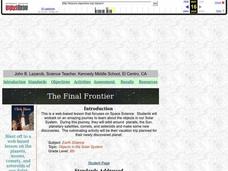Curated OER
Science - Lesson 42 - Astronomy
Third graders demonstrate the position of the Earth, Moon, and Sun in a solar and lunar eclipse. They list uses for manmade satellites and write a description of how a satellite would be use.
Curated OER
Unveiling the Secrets of Saturn
Students read and study an article then answer questions on Saturn. In this investigative lesson students identify ways space exploration has helped humanity and then they search the Internet for space pictures and sketch a drawing of...
Curated OER
Animating Motion
Students apply what they recall about objects in motion by animati ng sequences of pictures that model a set of physical conditions. They animate the orbital motions of the Earth, the space shuttle, and the Moon based on calculations of...
Curated OER
Our Solar System to Scale
Middle schoolers calculate the diameter of planets and their relative distances. In this space science lesson, students discover how small or big the planets are in comparison to each other. Middle schoolers use cross multiplying...
Curated OER
Puzzles And Brain Teasers-- Rewriting a Poem
In this writing worksheet, students read a poem that seems absurd because the lines are not written with proper punctuation or verse spacing. Students rewrite the poem so it makes sense, changing only the punctuation and format on the page.
Curated OER
The Life Cycle of a Star
Students investigate the life cycle of a star through research. Once research is complete, students prepare posters and present findings to class. Flash animation is included to help students visualize life cycle of star researching.
Indian Land Tenure Foundation
Tribal Origin Stories
The teacher reads and retells Californian tribal origin or creation stories that come from the traditions of a variety of California Indian tribes. Then, pupils get together in groups and retell the stories they just heard; just as the...
Curated OER
The Tides
Students experience a computer based applet that explains why the Earth experiences tides.
Curated OER
Finding Out About the Stars and Planets
Students complete a web-based activity to study the planets and solar system. Students complete a number of activities including a slide show that depict the true facts about planets.
Curated OER
NIGHT AND DAY: DAILY CYCLES IN SOLAR RADIATION
High schoolers examine how Earth's rotation causes daily cycles in solar energy using a microset of satellite data to investigate the Earth's daily radiation budget and locating map locations using latitude and longitude coordinates.
Curated OER
Gravity - The Glue of the Universe
Students explore physics by conducting a class experiment. In this gravitational force lesson, students define several scientific terms associated with force. Students utilize a styrofoam cup and marbles to simulate a satellite crashing...
Curated OER
Gravity Gets You Down
Students investigate the force of gravity and how it effects different objects that are put into acceleration when applied the experiment of free falling. They drop different objects that have a variety of masses and some that cause air...
Curated OER
Sunny Delight
First graders explore completing experiments through the scientific method.
Curated OER
Scientist Tracking Network
Students correlate surface radiation with mean surface temperature of several geographic regions. They observe how these parameters change with latitude and construct an understanding of the relationship of solar radiation to seasonal...
Curated OER
Sky Show
Students participate in a discussion of the sky and colors. They watch a demonstration of how colors can change. They examine the issue of if weather should be a part of their coursework.
Curated OER
Worksheet 19: Ship Positions
In this math worksheet, learners read informational paragraphs and then answer 18 questions using data from their readings. Questions are about vectors, positions, distance and orbits.
Curated OER
An Introduction to the Night Sky and Movement Astronomy
Basically, this is an interactive exploration of educational astronomy software and an app. Young astronomers discover how the apparent motion of the sky relates to Earth's movements and the position of the observer. It is out of this...
New York Science Teacher
Planet Scaling using Extra Terrestrial Tools
Your class will use a set scale to convert diameters of planets to the model size, the diagram given to expand on the number of planets drawn as concentric circles, and examine the scale that would be needed to fit the larger planets on...
American Library Association
Great Early Elementary Reads
Here is an excellent reference list of over 60 recommended book titles for early readers, each of which includes the author, title, number of pages, and brief summary.
NASA
Collecting Electromagnetic Radiation
Astronomy is literally over your head, but this lesson will explain how we study it. Young scientists make telescopes, calculate and compare the light gathering power of lenses, and simulate detection of infared radiation. Materials...
International Technology Education Association
Pixel This!
Did the image I drew match the image you saw? By simulating a satellite and a ground station, teams of two transmit data in the form of pixels in order to recreate an image. They use four different levels of brightness, creating slightly...
Curated OER
Planets in Our Solar System
Each member of a four-student group takes on a specific aspect of an assigned planet to research. After gathering information, the team works together to create a travel brochure and a presentation intended to convince other classmates...
Rhythm Rhyme Results
Whatʼs the Same and Whatʼs Different?
Learn about radiation, convection, and conduction with a multiple choice worksheet. Each question prompts kids to decide what is different about each form of heat energy transfer, and what is the same.
Scholastic
Lesson One: The Earth, Background and Glossary
How much do you really know about our planet? Middle schoolers build up their prior knowledge about Earth, its placement in the solar system, its composition, and important geological vocabulary with an introductory earth science lesson.


